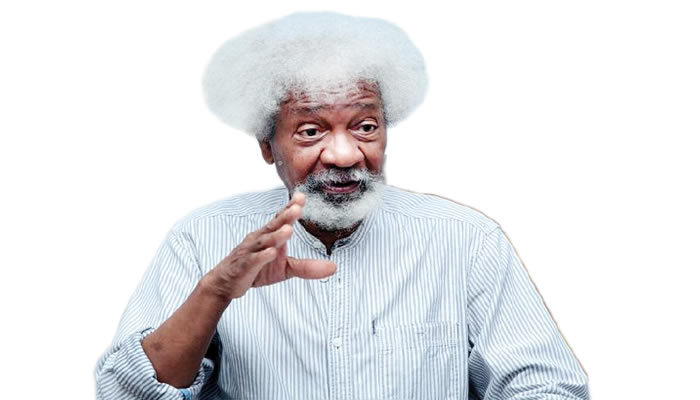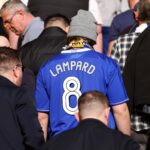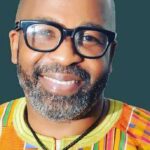
The foregoing quote was tweeted a few days ago by no other than Professor Kingsley Moghalu following the latest eruption of expletives by online trolls and the usual opportunistic thugs.
While featuring on a Channels TV programme (and later Arise TV) days earlier, the Nobel Laureate had expressed an objection to the “fascistic language” of the vice-presidential candidate of Labour Party, Datti Baba-Ahmed, in an earlier interview where he pointedly declared that inaugurating President-elect Bola Tinubu on May 29 would be tantamount to “a coup”, threatening the judiciary against making any judgment unfavorable to his party.
Of course, it wasn’t only the Labour Party candidate that received a full measure of Professor Soyinka’s caustic tongue. The literary giant was equally unsparing of both candidates of the All Progressives Congress and the Peoples Democratic Party (Bola Tinubu and Atiku Abubakar) while fielding questions on a wide range of national issues.
However, the most uncouth, vile reactions have been pouring in only from one corner. But the one I consider the unkindest cut is the insinuation of ethnic bias against Soyinka by a converging mob. Of course, such thinking feeds from either rank illiteracy or loss of a sense of history.
For sure, this rabble would rather pride themselves today on being “enforcers” of the “Third Force”. But those who know a little more about the history of its actual evolution will certainly shake their heads in pity for those who, as they say, are in a hurry to satiate their lungs with free oxygen without bothering about its provenance.
Only ignorance — laced with malice, perhaps — could have led anyone to accuse Soyinka of Igbo-phobia when the same man had rooted for Moghalu five years ago (as one of the early champions of the “Third Force” ahead of the 2019 polls), against his fellow Yoruba like Omoyele Sowore and Fela Durotoye also on parade then.
I witnessed one of the exploratory discussions in Lagos. The meeting took place precisely on August 20, 2018 at the fifth floor of a high-rise overlooking the Atlantic Ocean on Victoria Island. A day earlier, Professor Soyinka had called and asked yours sincerely to join him at the meeting with Moghalu. My interest or qualification? Well, let me say that I enjoy the privilege of being a disciple of Kongi, an instinctive teacher and, above all, a compelling moral authority.
That fateful evening, Moghalu came with a small team. Two of us accompanied Professor Soyinka. It serves no purpose to make a full disclosure of the details of the conversation which lasted several hours between Kongi and the former deputy governor of the Central Bank.
Suffice it to say that it was a great evening as the Nobel laureate and Moghalu, a very cerebral man, engaged the national condition and possible way forward. While we mostly listened. I believe a few more meetings took place after which Kongi made up his mind.
A couple of months later, Soyinka, in his capacity as the convener of the Citizen Forum, eventually declared without any ambiguity in a statement: “Over the past few months, we studied the careers, experiences and track records of most of the presidential aspirants, and most intensely those actually short-listed by the opposition parties themselves. Like millions of Nigerians, we watched the debates. I physically interacted with some of the acknowledged top contenders, in some cases several times.
“We participated in HANDSHAKE ACROSS NIGERIA, where some candidates presented their briefs. Among others, I delivered a keynote address. We watched television interviews. We have exchanged notes with highly respected international civil servants. The drive towards consensus among these dedicated groups sometimes took the form of test questionnaires to the aspirants, including items such as: ‘Who among the contestants would you choose, if you did not emerge as the ultimate preference?’
“There was nothing complicated about assessment parameters: mental preparedness, analytical aptitude, response to the nation’s security challenges, economic grounding, grasp of socio-political actualities, including a remedial concern with the Nigerian image in foreign perception etc. etc. not forgetting a convincing commitment to governance and resource decentralization — commonly referred to as Restructuring.
“The Forum rejected retrograde propositions of a political merry-go-round, which urge the electorate to choose this or that candidate in order to ensure ‘our turn’ at the next power incumbency.”
To an extent, Soyinka’s endorsement of Moghalu (of the Young Progressives Party) as the “consensus candidate” could, therefore, be described as the first most consequential affirmation of a “Third Force” after the tectonic shift of 2015 that displaced the PDP and enthroned the APC. That symbolic rite of 2019 prepared the grounds for what Labour Party was supposed to embody in the 2023 polls.
If my recollection is correct, my friend and brother, Sowore didn’t like the idea and so decided to go solo. He had the distinction of ending up as the third runner-up to the President, Major General Muhammadu Buhari (retd.), in the 2019 polls. After the polls, I remember I had called Yele up and congratulated him on the “feat” and encouraged him to see himself as very, very promising for the future.
It is, therefore, quite shocking to hear some voices among the online mob today accusing Soyinka of Igbo-phobia, when the same man had asked Sowore and Durotoye to step down for Moghalu in 2019. Before Moghalu, Kongi had initially endorsed my big brother and friend, Professor Pat Utomi (another Igbo from Delta State) who incidentally is also today a member of Peter Obi’s think tank, as the tentative “face” of the “Third Force”.
Well, these folks who are undernourished and malnourished from the poor dietary offerings on Instagram, Twitter and Facebook, have become a danger to themselves and to society. They don’t and can’t read. Otherwise, they will know that, for the love of Igbo out of a strong belief in human solidarity and overarching devotion to the cause of justice, this same man had dared visit Odumegwu Ojukwu in the Biafran enclave in October 1966 before the outbreak of the civil war.
That mission marked him out as “an enemy of the state” and landed him in Gowon’s gulag where he would endure solitary confinement for 30 months, enduring physical deprivation and the worst form of mental torture. And in the heady second republic, Kongi would pitch his tent, not with Yoruba-led UPN, but radical PRP led revolutionary Aminu Kano, a northerner.
They don’t read and can’t read. Otherwise, they would know how sacrilegious it is to open unwashed mouths against a literary deity. According to journalist Dele Elempe, “When you remember Wole Soyinka is in the same category of iconic Nobel laureates (persons who are honoured with awards for outstanding creative or intellectual achievements) including the likes of Butler Yeat, T.S. Elliot, William Faulkner, Russell Betrand, Sir Winston Churchill, Ernest Hemmingway, Albert Camus, Jean Paul Sartre, Alexandr Solzhenitsyn, Samuel Beckett, Pablo Neruda, Gabriel Marquez, you will understand he does not need the acceptance of anyone, especially online fools, for anything.”
So, Kongi’s allusion to fascism about a certain tendency today is no hyperbole. In fact, it merely scratches the surface of a much deeper malaise afflicting contemporary civic space in Nigeria: the death of civility in public conversation.
Perhaps, the closest parallel in world history will be the dual spectres of Benito Mussolini and Adolf Hitler of Italy and Germany of the 20th century respectively, both of whom sought to infest the international community with the virus of fascist, “my view or your death” culture. This is the notion of reality conditioned by the myopia of diseased lens.
As we now witness in typical online conversation in contemporary Nigeria (extending to the Diasporan network), crass ignorance forcibly seeks to displace knowledge rooted in temperance. The tendency is to quickly resort to verbal abuse once unable to sustain an intellectual argument.
On a personal note, yours sincerely had similarly encountered not a few of such monstrous creatures on the treacherous, even perilous, road to the last general poll. The acutely brainwashed or victims of an affliction a Canadian-based poet, Kingsley Jesuorobo, memorably characterised as “mind theft”.
For many, the anonymity of the social media simply provides a license to postulate without empirical premise, libel without conscience and bully without provocation, all in the pursuit of political interest, however hideous. Without shame, one such character once proudly told me he had no patience to “read anything more than 200 words.” Yet, he was quick to levy a scholarly “war”, only to expose arms that appeared long enfeebled by intellectual arthritis.
In the final analysis, for me, the real concern is not so much the insouciance of the children of ignorance running amok and peddling lies in the civic space, but more about the complicity of those who know the truth but keep silence because it suits their present political calculations.
Now, the uncomfortable poser: shall we, out of fear of being hit by the proverbial stray missile, now surrender the national space to these little philistines on a rampage? Shall we?
Odion is a former Commissioner for Information and Orientation, Edo State





